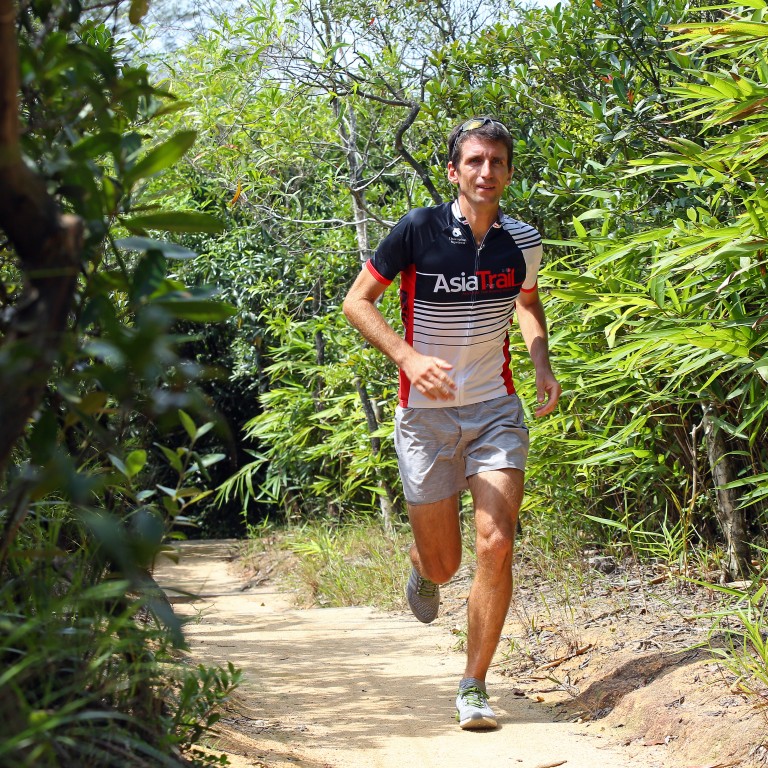
Ultrarunner more exhausted organising races than running them
Entrepreneurial spirit of Hong Kong convinced Clement Dumont to throw in his job and launch races and trail racing magazine. He's not looked back since
As we enter the cooler months of the year when runners descend onto Hong Kong’s trails, we meet three race directors leading the burgeoning trail-racing scene.
Planning ahead for their 40th birthdays, most people dream of elaborate parties or holidays on remote beaches. Not Clement Dumont. He is dreaming of a 330-kilometre mountain run through the Italian Alps which would take roughly six days to complete.
“I like a challenge,” says Dumont, 38, while reminiscing about his adventures in life.
As a teenager he trained on France’s Olympic windsurfing team; aged 20 he cycled 2,500km through Australia’s desert with his brother. Two years later he became the youngest man to complete the 250km, six-day Marathon Des Sables through the Moroccan desert, and five years after that, to celebrate attaining his PhD, he cycled 1,800km off-road through five countries crossing Central America.
Dumont’s lust for adventure has even spread to his career: three years ago the doctor of marine biology gave up his profession to pursue his love for running. Today, Dumont is a competitive ultrarunner and, together with his wife Sabrina, is director of some of Hong Kong’s most loved trail-running races.

The radical change happened by accident. A resident of Lantau Island and intimate with its trails, in 2011 he hosted a private run for friends, who encouraged him to hold a race the following year.
“It just started like this: there was no ambition to become a race director,” says Dumont.
But his dreams got bolder and two years later, he founded Asia’s first trail-running magazine, Asia Trail. “People said we were crazy: a French couple with no experience trying to run a magazine in English?”
He gambled on the first issue, which broke even. Now the bimonthly magazine has 40,000 copies printed a year across seven countries.
"Ultrarunning gives you a lot of confidence – it pushes you to your limits, to a place where you start losing confidence,” says Dumont, “and then you find that even though you’ve reached the limit, you can keep going.”
I am surprised with where I am in life today. Before I came to Hong Kong I was really dedicated to my work as a marine biologist. I was diving all over the world for research – under icebergs in North Canada, [off] California, Mexico, South America and Asia. It was an exciting job; it was a dream job. But there is something about the entrepreneurial spirit of Hong Kong that pushes you to try new things. Giving up my career was not an easy decision, but I think in life you have to do what makes you happy.
I don’t think you have to be a runner to organise an ultramarathon, but I think you need to be a runner to design a course that runners want to run. It’s quite easy for me to estimate the time it takes between checkpoints for all runners and, being a runner, I think I know what runners expect.

The number one factor when designing a course is safety. You don’t want to play around – accidents do happen on the trails and this is not something you want to happen in your race.
Even though we already had a successful event, the Lantau 50, we decided to increase the distance and put on the Translantau 100 in 2014. I could see people were interested in running further, and I realised if I didn’t do it, someone else would. That pushed me.
It may sound clichéd but the most satisfying part of being a race director is watching people cross the finish line. The more exhausted they are, the better the feeling.
I get more exhausted organising races than running them. When you run you have physical exhaustion; when you organise a race you have a layer of stress on top of physical stress. I like it, because my personality can handle it, but it’s quite stressful.
I have more flexibility to run these days. I ultimately work more but I’m flexible with my time. I usually run in the morning and then work for the rest of the day and the evening if I need to. Race directing also forms part of my training: when planning [a race in Taiwan recently], I did a recce of the 100-kilometre course three times in two weeks. I planned it as part my endurance training for the Ultra-Trail Mont Blanc in August.
Ultrarunning gives you a lot of confidence – it pushes you to your limits, to a place where you start losing confidence, and then you find that even though you’ve reached the limit, you can keep going.
My most painful running experience was during the Marathon de Sables in 2000. I suffered like nothing else. I wasn’t prepared for the race. Two months before the event I broke my foot, so I could only swim to train. For the race I didn’t have any dried food, just bags of rice that I cooked each evening. I didn’t train with a backpack. But somehow I finished.
I believe trail running is about discovering a country or new places in an active way. People complain there are too many races, but I see it as an opportunity. You don’t have to do every race every year. Pick the ones you want to do, make a list, alternate.
Each individual has a limit. I think there are mental limits and physical limits. But I don’t think I’ve found mine yet. And when you see people doing amazing endurance feats, it makes me think that I still have places to go. I don’t know what the limits are.
